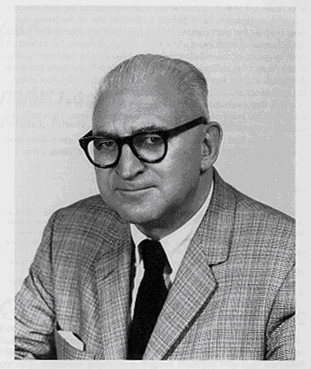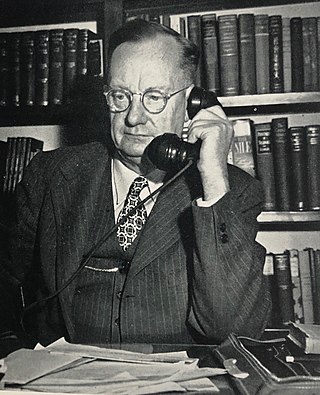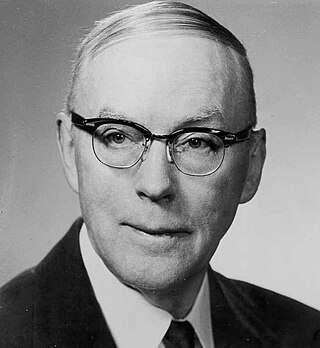Related Research Articles
Social science is one of the branches of science, devoted to the study of societies and the relationships among individuals within those societies. The term was formerly used to refer to the field of sociology, the original "science of society", established in the 18th century. In addition to sociology, it now encompasses a wide array of academic disciplines, including anthropology, archaeology, economics, human geography, linguistics, management science, communication science, psychology and political science.
Melvin Lawrence DeFleur was a professor and scholar in the field of communications. His initial field of study was social sciences.

Harold Dwight Lasswell was an American political scientist and communications theorist. He earned his bachelor's degree in philosophy and economics and his Ph.D. from the University of Chicago. He was a professor of law at Yale University. He served as president of the American Political Science Association, American Society of International Law, and World Academy of Art and Science.
Public opinion, or popular opinion, is the collective opinion on a specific topic or voting intention relevant to society. It is the people's views on matters affecting them. The term originates from France, and first appeared in the 17th century, though writers had identified the importance of the opinion of the people long before this. Prior to the advent of mass media, public fora such as coffee houses and gentlemen's clubs were used as exchanges of opinion and some reputable locations had great influence.
In sociology, social distance describes the distance between individuals or social groups in society, including dimensions such as social class, race/ethnicity, gender or sexuality. Members of different groups mix less than members of the same group. It is the measure of nearness or intimacy that an individual or group feels towards another individual or group in a social network or the level of trust one group has for another and the extent of perceived likeness of beliefs.

Social research is research conducted by social scientists following a systematic plan. Social research methodologies can be classified as quantitative and qualitative.

Emory Stephen Bogardus was an American sociologist. He founded one of the first sociology departments at an American university, at the University of Southern California in 1915.
The Bogardus social distance scale is a psychological testing scale created by Emory S. Bogardus to empirically measure people's willingness to participate in social contacts of varying degrees of closeness with members of diverse social groups, such as racial and ethnic groups.
Merle Eugene Curti was an American progressive historian who influenced peace studies, intellectual history and social history, including by using cliometrics. At Columbia University and for decades at the University of Wisconsin, Curti directed 86 finished Ph.D. dissertations and had a wide range of correspondents. He was known for his commitment to democracy, as well as the Turnerian thesis that social and economic forces shape American life, thought and character.
The World Association for Public Opinion Research (WAPOR) is an international professional association of researchers in the field of survey research. It is a member organization of the International Science Council.
Floyd Henry Allport was an American psychologist who is often considered "the father of experimental social psychology", having played a key role in the creation of social psychology as a legitimate field of behavioral science. His book Social Psychology (1924) impacted all future writings in the field. He was particularly interested in public opinion, attitudes, morale, rumors, and behavior. He focused on exploration of these topics through laboratory experimentation and survey research.

Samuel Andrew Stouffer was a prominent American sociologist and developer of survey research techniques. Stouffer spent much of his career attempting to answer the fundamental question: How does one measure an attitude?
Bernard Reuben Berelson (1912–1979) was an American behavioral scientist, known for his work on communication and mass media.

Douglas Waples was a pioneer of the University of Chicago Graduate Library School in the areas of print communication and reading behavior. Waples authored one of the first books on library research methodology, a work directed at students supervised through correspondence courses. Jesse Shera credits Waples’s scholarly research into the social effects of reading as the foundation for the approaches to the study of knowledge known as social epistemology. In 1999, American Libraries named him one of the "100 Most Important Leaders We Had in the 20th Century".
James A. Davis (1929–2016) was a distinguished American sociologist who is best known as a pioneer in the application of quantitative statistical methods to social science research and teaching. Most recently, he was a Senior Lecturer in Sociology at the University of Chicago.
Claude E. Robinson (1900–1961) was an American pioneer in advertising research and opinion survey research techniques. Along with George Gallup, he was instrumental in developing many scientific sampling techniques that were later used in Gallup polls and other public opinion research surveys.
Albert Hadley Cantril, Jr. was an American psychologist from the Princeton University, who expanded the scope of the field.

George Andrew Lundberg was an American sociologist.
Harry Alpert (1912–1977) was an American sociologist, best known for his directorship of the National Science Foundation's (NSF) social science program in the 1950s. During his time at the NSF (1953-1958), Alpert guided the development of the U.S. NSF's earliest efforts to provide funding to the social sciences, and helped to establish the agency's basic policy framework for funding social science research and fellowships. In his short five-year term as director, Alpert was able to establish a viable policy framework for NSF funding that would help to demonstrate both the value and scientific legitimacy of social science research.
Everett Carll Ladd Jr. was an American political scientist based at the University of Connecticut. He was best known for his analysis and collection of public opinion polls. He directed the Roper Center for Public Opinion Research at the University of Connecticut; the Center's mission is to collect and preserve the reports and the original raw computerized data of polls and surveys since the 1930s. At his death, he had amassed 14,000 surveys from many countries. He was also an expert on the opinions and careers of social scientists.
References
- ↑
- Otto N. Larsen (1976). "In Memoriam: Stuart Carter Dodd, 1900-1975". In: The Public Opinion Quarterly, Vol. 40, No. 3 (Autumn, 1976), pp. 411-412.
- ↑ http://www.stuartcdoddinstitute.org/docs/Stuart%20C%20Dodd.pdf [ bare URL PDF ]
- ↑ Stuart C. Dodd (1946). "Towards World Surveying". In: Public Opinion Quarterly, volume 10, page 470.
- ↑ Stuart C. Dodd and Jiri Nehnevajsa (1954). "Physical Dimensions of Social Distance". In: Sociology and Social Research Vol 38 (May–June 1954): pp. 287-292.
- ↑ Philip J. Ethington, "The Intellectual Construction of "Social Distance": Toward a Recovery of Georg Simmel’s Social Geometry". Retrieved 16 June 2008.
- ↑ Alonzo Church (1942). "Review: Stuart Carter Dodd, Dimensions of Society. A Quantitative Systematics for the Social Sciences". In: Journal of Symbolic Logic . Volume 7, Issue 3 (1942), 128-129.
- ↑ Shanas, Ethel (1942). "A Critique of Dodd's Dimensions of Society". American Journal of Sociology. 48 (2): 214–230. ISSN 0002-9602.